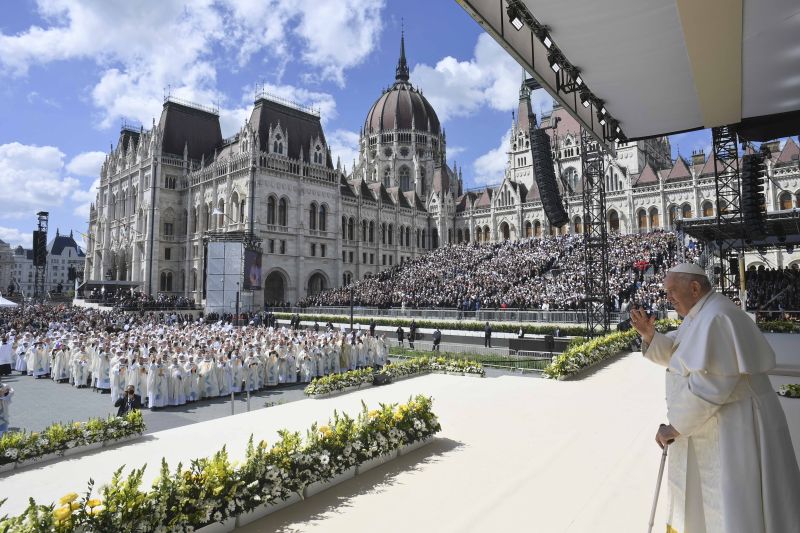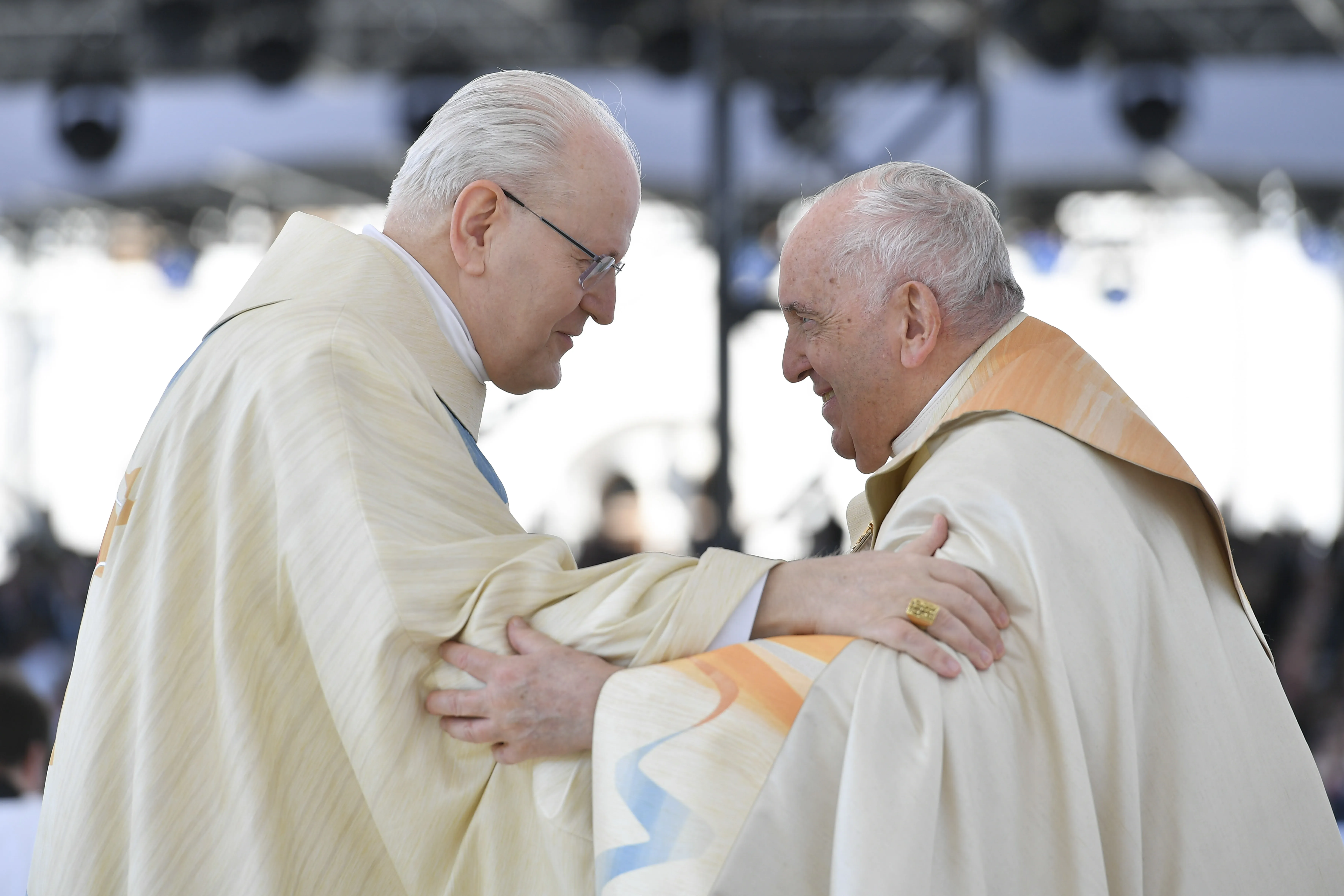
What does the Catholic Church teach about immigration and immigrants?
 Dainelys Soto, Genesis Contreras, and Daniel Soto, who arrived from Venezuela after crossing the U.S. border from Mexico, wait for dinner at a hotel provided by the Annunciation House on Sept. 22, 2022 in El Paso, Texas. / Credit: Joe Raedle/Getty Images
Dainelys Soto, Genesis Contreras, and Daniel Soto, who arrived from Venezuela after crossing the U.S. border from Mexico, wait for dinner at a hotel provided by the Annunciation House on Sept. 22, 2022 in El Paso, Texas. / Credit: Joe Raedle/Getty Images
CNA Staff, Sep 9, 2024 / 06:00 am (CNA).
Long a champion of immigrants, particularly those fleeing war-torn countries and impoverished regions, Pope Francis last month delivered some of the clearest words in his papacy yet in support of migrants — and in rebuke of those who turn away from them.
“It must be said clearly: There are those who work systematically and with every means possible to repel migrants,” the pope said during a weekly Angelus address. “And this, when done with awareness and responsibility, is a grave sin.”
“In the time of satellites and drones, there are migrant men, women, and children that no one must see,” the pope said. “They hide them. Only God sees them and hears their cry. This is a cruelty of our civilization.”
The pope has regularly spoken out in favor of immigrants. In June he called on the faithful to “unite in prayer for all those who have had to leave their land in search of dignified living conditions.” The Holy Father has called the protection of migrants a “moral imperative.” He has argued that migrants “[must] be received” and dealt with humanely.

The Catholic Church has long been an advocate and protector of immigrants. The U.S. Conference of Catholic Bishops (USCCB) notes on its website that “a rich body of Church teaching, including papal encyclicals, bishops’ statements, and pastoral letters, has consistently reinforced our moral obligation to treat the stranger as we would treat Christ himself.”
The Catechism of the Catholic Church teaches that prosperous nations “are obliged, to the extent they are able, to welcome the foreigner in search of the security and means of livelihood which he cannot find in his country of origin.”
Popes throughout the years, meanwhile, have expressed sentiments on immigration similar to Francis’. Pope Pius XII in 1952, for instance, described the Holy Family’s flight into Egypt as “the archetype of every refugee family.”
The Church, Pius XII said, “has been especially careful to provide all possible spiritual care for pilgrims, aliens, exiles, and migrants of every kind.”
Meanwhile, “devout associations” throughout the centuries have spearheaded “innumerable hospices and hospitals” in part for immigrants, Pius XII said.
Implications and applications of Church teaching
Chad Pecknold, an associate professor of systematic theology at The Catholic University of America, noted that the catechism “teaches that nations have the right to borders and self-definition, so there is no sense in which Catholic teaching supports the progressive goal of ‘open borders.’”
“There is a ‘duty of care’ which is owed to those fleeing from danger,” he told CNA, “but citizenship is not owed to anyone who can make it across a national border, and illegal entry or asylum cannot be taken as a debt of citizenship.”
Paul Hunker, an immigration attorney who previously served as chief counsel of U.S. Immigration and Customs Enforcement (ICE) in Dallas, agreed.
“States have to have responsibility for their own communities, they have to look out for them,” he told CNA. “So immigration can be regulated so as to not harm the common good.”
Still, Hunker noted, Catholic advocates are not wrong in responding to immigration crises — like the ongoing irregular influx through the U.S. southern border — with aid and assistance.

Many Catholic organizations offer shelter, food, and legal assistance to men, women, and children who cross into the country illegally; such groups have been overwhelmed in recent years with the crush of arriving migrants at the country’s southern border.
“It’s the responsibility of the federal government to take care of the border,” he said. “When the government has created a crisis at the U.S. border, Catholic dioceses are going to want to help people.”
“I completely support what the Catholic organizations are doing in Mexico and the United States to assist people who are there,” Hunker said. “The people responding are not responsible for these crises.”
Latest crisis and legal challenge
Not everyone feels similarly. Texas Attorney General Ken Paxton has launched an investigation of multiple Catholic nonprofits that serve illegal immigrants in the state. Paxton alleges that through the services it provides to migrants, El Paso-based Annunciation House has been facilitating illegal immigration and human trafficking.
A lawyer for the group called the allegations “utter nonsense,” though attorney Jerome Wesevich acknowledged that the nonprofit “serves undocumented persons as an expression of the Catholic faith and Jesus’ command to love one another, no exceptions.”
There are considerable numbers of Church teachings that underscore the need for a charitable response to immigrants. In his 1963 encyclical Pacem in Terris, Pope John XXIII argued that man “has the right to freedom of movement and of residence within the confines of his own state,” and further that “when there are just reasons in favor of it, he must be permitted to emigrate to other countries and take up residence there.”
In the encyclical Caritas in Veritate, meanwhile, Pope Benedict XVI in 2009 acknowledged that migration poses “dramatic challenges” for nations but that migrants “cannot be considered as a commodity or a mere workforce.”
“Every migrant is a human person who, as such, possesses fundamental, inalienable rights that must be respected by everyone and in every circumstance,” the late pope wrote.
Edward Feser, a professor of philosophy at Pasadena City College in California, noted that the Church “teaches that nations should be welcoming to immigrants, that they should be sensitive to the hardships that lead them to emigrate, that they ought not to scapegoat them for domestic problems, and so on.”
Catholic teaching does not advocate an ‘open borders’ policy
Yet Catholic teaching does not advocate an “open borders” policy, Feser said. He emphasized that the catechism says countries should accept immigrants “to the extent they are able,” and further that countries “may make the exercise of the right to immigrate subject to various juridical conditions.”
There “is nothing per se in conflict with Catholic teaching when citizens and politicians call on the federal government to enforce its immigration laws,” Feser said. “On the contrary, the catechism backs them up on this.”
In addition, it is “perfectly legitimate,” Feser argued, for governments to consider both economic and cultural concerns when setting immigration policy. It is also “legitimate to deport those who enter a country illegally,” he said.
Still, he acknowledged, a country can issue exceptions to valid immigration laws when the moral situation demands it.
“Of course, there can be individual cases where a nation should forgo its right to deport those who enter it illegally, and cases where the manner in which deportations occur is associated with moral hazards, such as when doing so would break up families or return an immigrant to dangerous conditions back in his home country,” he said.
“Governments should take account of this when formulating and enforcing policy,” he said.
The tension between responding charitably to immigrants and ensuring a secure border was perhaps put most succinctly in 1986 by the late Father Theodore Hesburgh, who served as chairman of the U.S. Select Commission for Immigration and Refugee Policy that was created by the U.S. Congress in the early 1980s.

Writing several years after the commission, Hesburgh explained: “It is not enough to sympathize with the aspirations and plight of illegal aliens. We must also consider the consequences of not controlling our borders.”
“What about the aspirations of Americans who must compete for jobs and whose wages and work standards are depressed by the presence of large numbers of illegal aliens?” the legendary late president of the University of Notre Dame reflected. “What about aliens who are victimized by unscrupulous employers and who die in the desert at the hands of smugglers?”
“The nation needn’t wait until we are faced with a choice between immigration chaos and closing the borders,” Hesburgh stated nearly 40 years ago.




